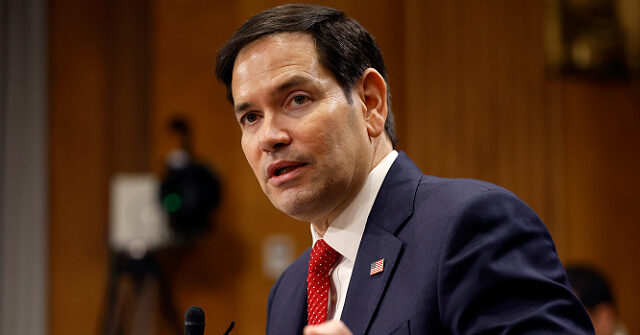Secretary of State Marco Rubio says he has blocked the award of new visas that would enable migrants to legally or illegally drive 18-wheeler trucks on American highways.
“Effective immediately, we are pausing all issuance of worker visas for commercial truck drivers,” he announced Thursday evening. “The increasing number of foreign drivers operating large tractor-trailer trucks on U.S. roads is endangering American lives and undercutting the livelihoods of American truckers.”
The announcement is a useful admission by the agency that many migrants get U.S. jobs after getting temporary visas from the State Department. This inflow of legalized economic migrants is usually ignored in the uproar over illegal migration — but it also has a huge and damaging impact on Americans’ wages, productivity, and innovation.
The temporary pause was announced almost a week after an Indian driver allegedly killed three Americans on a Florida turnpike after doing a U-turn that blocked the opposing lanes. Since that videotaped accident, Transportation Secretary Sean Duffy announced tighter enforcement of the safety laws and promised to investigate how state officials allowed the Indian immigrant to drive a truck without being able to understand English or road signs.
Florida Gov. Ron DeSantis is also trying to deal with the problem of reckless foreign truckers.
Rubio’s announcement does not withdraw existing visas for the very many migrants who are now driving trucks, often with drivers’ licenses carelessly awarded by pro-migration states, such as California and Utah.
The announcement does not say which visas will be denied.
Seasonal H-2B visas are also used to legally import truckers for the agriculture industry.
However, many foreign truckers use temporary B-1/B-2 visitor visas to illegally work, and many get E-2 investor visas that allow them to legally work as truckers in the United States.
Both are used in large numbers by Indians to get trucking jobs in the United States. Also, many Indians used F-1 student visas to get into the United States, but quickly and illegally take jobs in hotels, stores — and perhaps at trucking companies.
Foreign truckers in Mexico, Canada, and Eastern Europe also use the B-1/B-2 visa to drive in the United States.
Prior to this administration, federal officials had conducted very little oversight into the activities of visa holders.
Advocates for American truckers cheered Rubio’s news.
Pro-migration advocates jeered Rubio’s decision.
“Massive truck driver shortage that is driving up the prices of everything we purchase and Rubio decides to make it worse based on an anecdote,” said David Bier at the Cato Institute. “Totally absurd decision making process though I don’t know what visas he’s even talking about ‘pausing.’”
For many years, trucking companies have insisted there is a shortage of drivers in a vast nation of roughly 170 million blue-collar and white-collar workers. Advocates for truckers, however, say the industry is not paying drivers enough to keep them on the gruelling job, which often keeps truckers on the road and away from their families for more than a week at a time.
Read the full article here


